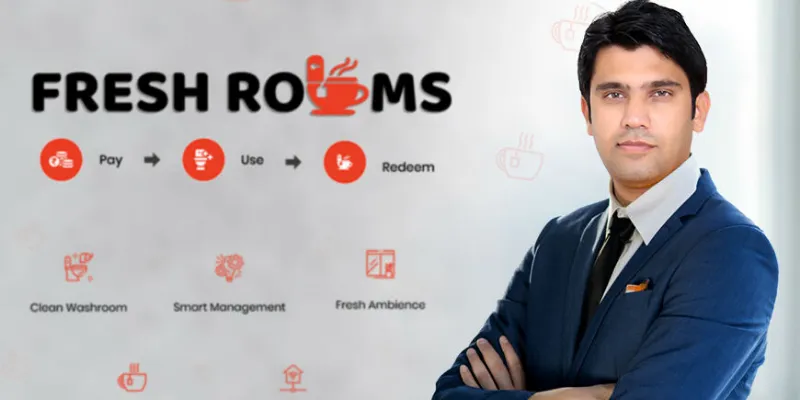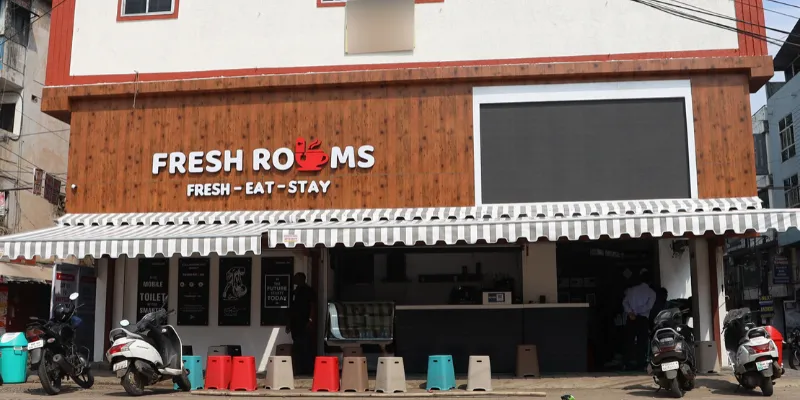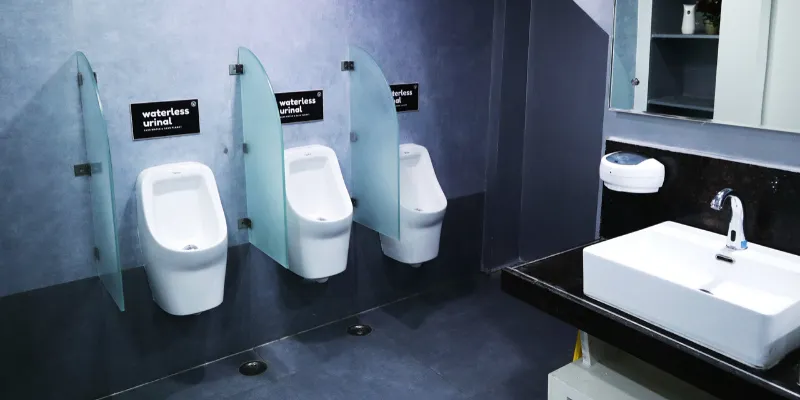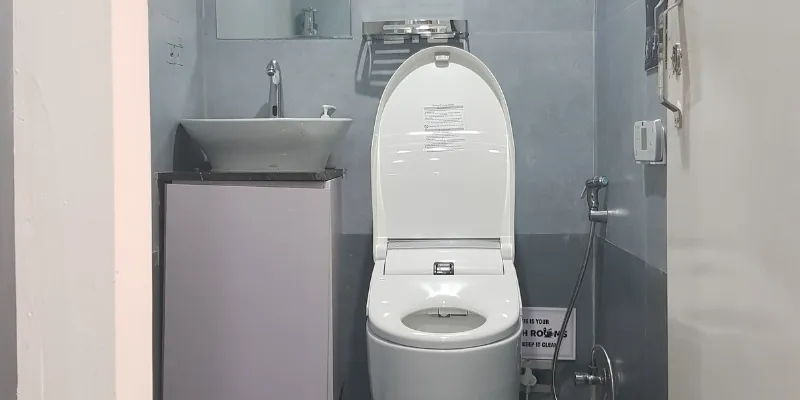This startup aims to transform public sanitation in India with IoT-based smart toilets
Fresh Rooms is setting up IoT-based multipurpose public toilets with waterless washrooms, shower areas, locker rooms, and dedicated baby care spaces.
For a lot of people, the mere thought of using a public toilet can be a nightmare. Despite a lot of precautions, a lot of women tend to fall prey to infections and bacterial diseases due to unhygienic menstruation practices and dirty washrooms.
According to the National Center for Biotechnology Information (NCBI), a significant association was seen between the occurrence of urinary tract infections (UTI) and the usage of public toilets.

Ashutosh Giri, Founder, Fresh Rooms.
In an attempt to resolve this, 34-year-old Ashutosh Giri founded , a startup that focusses on setting up public convenience utilities and smart toilets using Internet of Things (IoT). The model works on a pay-use-redeem concept and includes multiple facilities besides washrooms – shower areas, baby care spaces, dedicated cafeterias, luggage enclosures, and even bedrooms.
“The whole idea behind this is to provide people with some of the basic sanitation facilities they need while moving around or travelling. Access to equitable hygiene is not only key to healthy living, but also to the development of a sustainable ecosystem. Unfortunately, there are several gaps in India when it comes to this. We are intending to bridge this through innovation and collaboration,” Ashutosh tells SocialStory.

Fresh Room's utility center in Bhopal.
The startup has already launched its first utility centre, a 1,000 square feet space, at Maharana Pratap Nagar in Bhopal. So far, more than 25,000 people have benefitted from the toilets and its amenities. Fresh Rooms is now setting up another facility near the railway station in Allahabad.
Breaking new ground
Ashutosh completed his master’s in Business Administration from Pune University and went on to work in the sales division of companies like Daikin and Panasonic India.
Back then, he used to travel extensively to several Tier-II cities and small towns to close consignments. Ashutosh had no option but to use public toilets during these trips. However, every time he stepped into one, he would cringe at their unsanitary conditions.
That was when he began thinking about solutions to tackle the issue. In 2016, Ashutosh quit his job and decided to invest his time in research and development. He took a personal loan from the bank, put together a few like-minded individuals, and began exploring various technological interventions to improvise sanitary facilities.

Fresh Rooms receiving the Golden Glory Award.
“We spent six months testing all the nuts and bolts required to build smart, eco-friendly, hygienic latrines, and other conveniences. We tried to leverage concepts like IoT, Artificial Intelligence (AI), and sensor mechanics for the same. The journey was not easy. We dealt with multiple failures and there were times when we had to scrap everything and start from scratch,” recollects Ashutosh.
In 2018, Fresh Rooms was finally set up at Indore, Madhya Pradesh. Just a few months after it was established, the startup received a seed funding of around Rs 3 crore from an angel investor. Now, it has a team of 45 people working towards setting up public utilities in as many places as possible.
How Fresh Rooms works
The startup is an extension of the modern-day ‘smart toilet’. The entire model is envisaged around enabling people to not only relieve themselves, but also give them a pit stop to freshen up. It has features like a washroom, refreshment centre, cloakroom, shower area, and private spaces. Most of the setup is powered by solar energy and the usage of water is limited to the minimum extent possible.

The waterless urinals at the set up.
“We always wanted to build the facility in such a way that it is environment -friendly. We have erected waterless urinals that can trap the waste and convert it to be used in the form of urea later. The toilets have sanitary dispensers, UV protected antibacterial sheets, and a provision to control the temperature according to climatic conditions using sensors,” explains Ashutosh.
The startup also launched an app that allows people to gather information about the location of the nearest public toilet and its opening hours. To start with, the application requires individuals to register themselves by entering basic details like their names and mobile numbers. Once an account is created, the user can accumulate points against the service charge they have to pay to use the utilities. This, in turn, can be redeemed at a later point by purchasing food and beverage at the cafeteria.

The stay inside Fresh Room's utility.
One only needs Rs 5 to use the toilet facilities. The charges for other facilities like lockers, shower, and stay fall in the range of Rs 20 to Rs 250 depending on the usage.
“Safety being our utmost priority, we have a QR code mechanism at the entry points of the toilets. So, every time an individual wants to use the washroom, they need to open the mobile app and scan the code. This also helps us put together data in terms of number of users at any given time period,” says Ashutosh.
Revolutionising sanitation in India
Fresh Rooms is presently in the process of collaborating with the Uttar Pradesh government to set up its facilities. Once confirmed, the startup is planning to operate according to the public-private-partnership (PPP) model.

The IoT-enabled toilet area built by Fresh Rooms.
“Fresh Rooms, if scaled up, has the potential to transform the public sanitation space in India. Its set up can make clean, safe washrooms a reality. Since the ecosystem has been built after taking into account sustainable and hygienic practices, the problems surrounding ill health and mismanagement of waste is also take care of. Most importantly, the startup’s mission falls in line with the country’s Swachh Bharat goals,” says B Vijay Datta, Commissioner, Bhopal Municipal Corporation.
(Edited by Saheli Sen Gupta)









